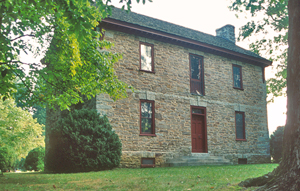MPC Certified Historic Preservation Program Shows Commitment to Protecting Area's Historic Resources

Blount Mansion, Old Gray Cemetery, and Ramsey House are just a few of the properties in Knoxville and Knox County listed on the National Register of Historic Places. Each property on that list goes through an extensive nomination process and it's one of the duties of MPC's Historic Preservation planner to serve as a technical expert and shepherd nominations through the process. That job is made easier by the National Historic Preservation Act's Certified Local Government (CLG) Program.
What is the Certified Local Government Program?
Simply put, it is a partnership among federal, state, and local governments that promotes historic preservation at the grass-roots level.
The CLG program is an outgrowth of the National Historic Preservation Act (NHAP) passed by Congress in 1966 with the goal of furthering historic preservation nationwide. Realizing the need for citizen input into historic preservation projects, Congress made changes to the NHAP in 1980 and again in 1992 to allow city or county governments to become a CLG. Once certified, that government is recognized as having historic preservation experts on staff and is allowed to apply for funding through the CLG program.
The program is jointly overseen and administered by the National Park Service on the federal level and by the State Historic Preservation Office (SHPO) at the state level. Locally, MPC is authorized to administer the program in the Knoxville area.
What are the requirements for becoming a CLG?
Achieving CLG certification shows that the local government is committed to protecting the area's historic architectural treasures for future generations. In order to successfully apply to become a CLG, a local government must do the following.- It must adopt appropriate laws for the protection of historic properties.
- It must create a qualified historic zoning commission.
- It must keep a list of local historic properties on file.
- It must provide for public comment in the historic preservation program, including recommending properties for the National Register of Historic Places.
What are the benefits of being a CLG?
The key benefit of certification is the availability of expert technical advice from the SHPO and NPS staff. CLGs also have more opportunities to partner with preservation organizations such as the National Alliance of Preservation Commissions, the National Trust for Historic Preservation, and the National Main Street Center.
Additionally, certification shows a local government's ability to take on preservation-related projects, which helps SHPOs prioritize Federal funding or grants that they award. CLGs have higher priority in the funding process and are more likely to receive funds. The upcoming grant application period begins in August and right now, MPC is going over its project list to see which grants to apply for.
Knoxville/Knox County Historic Preservation Accomplishments as a CLG
Since 1985 MPC has been awarded Federal grants on behalf of the city and county for the following projects which have been successfully completed:
- Cultural Resources Plan (1985) (publ. 1987);
- National Register nominations (multiple) (1988);
- Design Guideline illustrations for Mechanicsville H-1 (1991);
- National Register data base (early 1990s); and
- French Broad National Register work and archeology (2010).
And, not to brag, but MPC, with the help of qualified historians, has added a total of 103 properties to the National Register!
For more information on organizations that provide support to CLGs as well the to general public, please visit the following websites:
- National Alliance of Preservation Commissions
- National Park Service, Technical Preservation Services
- National Trust for Historic Preservation
- Mainstreet.org
Posted 7-18-2012, written by Kaye Graybeal

